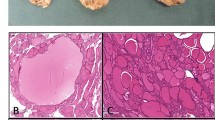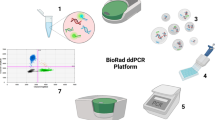Abstract
The goal of the present study was to investigate whether p53 antibodies (Abs) could be a relevant marker for papillary thyroid carcinoma (PTC). Three types of enzyme-linked immunosorbent assay (ELISA) methods were developed for the detection of p53 Abs, including p53-ELISA, phage-SS-ELISA, and phage-SP-ELISA. A total of 304 patients, including 117 cases with thyroid adenoma and 187 PTC patients, were enrolled in this study. Expression of p53 protein and mutation in BRAF gene were evaluated in paraffin-embedded tissue from 44 patients with PTC, in order to elucidate their correlations with the presence of p53 Abs. Compared with p53-ELISA and phage-SS-ELISA, phage-SP-ELISA presented the highest detection efficiency of p53 Abs in patients with PTC, and a combination of these three ELISA systems could make the detection of p53 Abs more sensitive than using each of the individual ELISA methods. Furthermore, p53 Abs was positively associated with clinical stage (P = 0.044), node metastasis (P = 0.010), and p53 protein accumulation (P = 0.019). These results indicate that serum p53 Abs could be a useful marker for PTC.



Similar content being viewed by others
References
L. Davies, H.G. Welch, Increasing incidence of thyroid cancer in the United States, 1973–2002. JAMA 295, 2164–2167 (2006)
S.A. Hundahl, I.D. Fleming, A.M. Fremgen, H.R. Menck, A National Cancer Data Base report on 53,856 cases of thyroid carcinoma treated in the U.S., 1985-1995. Cancer 83, 2638–2648 (1998)
D.S. Cooper, G.M. Doherty, B.R. Haugen, R.T. Kloos, S.L. Lee, S.J. Mandel, E.L. Mazzaferri, B. McIver, S.I. Sherman, R.M. Tuttle, American Thyroid Association Guidelines Taskforce, Management guidelines for patients with thyroid nodules and differentiated thyroid cancer. Thyroid 16, 109–142 (2006)
T. Kunavisarut, Diagnostic biomarkers of differentiated thyroid cancer. Endocrine 44, 616–622 (2013)
Y. Cohen, M. Xing, E. Mambo, Z. Guo, G. Wu, B. Trink, U. Beller, W.H. Westra, P.W. Ladenson, D. Sidransky, BRAF mutation in papillary thyroid carcinoma. J. Natl. Cancer Inst. 95, 625–627 (2003)
M.N. Nikiforova, Y.E. Nikiforov, Molecular diagnostics and predictors in thyroid cancer. Thyroid 19, 1351–1361 (2009)
M. Xing, D. Clark, H. Guan, M. Ji, A. Dackiw, K.A. Carson, M. Kim, A. Tufaro, P. Ladenson, M. Zeiger, R. Tufano, BRAF mutation testing of thyroid fine-needle aspiration biopsy specimens for preoperative risk stratification in papillary thyroid cancer. J. Clin. Oncol. 27, 2977–2982 (2009)
L. Crawford, D. Pim, R. Bulbrook, Detection of antibodies against the cellular protein p53 in sera from patients with breast cancer. Int. J. Cancer 30, 403–408 (1982)
T. Soussi, p53 Antibodies in the sera of patients with various types of cancer: a review. Cancer Res. 60, 1777–1788 (2000)
V. Goodell, L.G. Salazar, N. Urban, C.W. Drescher, H. Gray, R.E. Swensen, M.W. McIntosh, M.L. Disis, Antibody immunity to the p53 oncogenic protein is a prognostic indicator in ovarian cancer. J. Clin. Oncol. 24, 762–768 (2006)
C. Chapman, A. Murray, J. Chakrabarti, A. Thorpe, C. Woolston, U. Sahin, A. Barnes, J. Robertson, Autoantibodies in breast cancer: their use as an aid to early diagnosis. Ann. Oncol. 18, 868–873 (2007)
M. Lechpammer, J. Lukač, S. Lechpammer, D. Kovačević, M. Loda, Z. Kusić, Humoral immune response to p53 correlates with clinical course in colorectal cancer patients during adjuvant chemotherapy. Int. J. Colorectal Dis. 19, 114–120 (2004)
R. Ralhan, S. Arora, T.K. Chattopadhyay, N.K. Shukla, M. Mathur, Circulating p53 antibodies, p53 gene mutational profile and product accumulation in esophageal squamous-cell carcinoma in India. Int. J. Cancer 85, 791–795 (2000)
R. Tang, M.C. Ko, J.Y. Wang, C.R. Changchien, H.H. Chen, J.S. Chen, K.C. Hsu, J.M. Chiang, L.L. Hsieh, Humoral response to p53 in human colorectal tumors: a prospective study of 1,209 patients. Int. J. Cancer 94, 859–863 (2001)
P. Lenner, F. Wiklund, S. Emdin, C. Arnerlöv, C. Eklund, G. Hallmans, H. Zentgraf, J. Dillner, Serum antibodies against p53 in relation to cancer risk and prognosis in breast cancer: a population-based epidemiological study. Br. J. Cancer 79, 927–932 (1999)
J. Bourhis, R. Lubin, B. Roche, S. Koscielny, J. Bosq, I. Dubois, M. Talbot, P. Marandas, G. Schwaab, P. Wibault, B. Luboinski, F. Eschwege, T. Soussi, Analysis of p53 serum antibodies in patients with head and neck squamous cell carcinoma. J. Natl. Cancer Inst. 88, 1228–1233 (1996)
R.J. Gao, H.Z. Bao, Q. Yang, Q. Cong, J.N. Song, L. Wang, The presence of serum anti-p53 antibodies from patients with invasive ductal carcinoma of breast: correlation to other clinical and biological parameters. Breast Cancer Res. Treat. 93, 111–115 (2005)
N. Gandra, G. Abbineni, X. Qu, Y. Huai, L. Wang, C. Mao, Bacteriophage Bionanowire as a Carrier for Both Cancer-Targeting Peptides and Photosensitizers and its use in Selective Cancer Cell Killing by Photodynamic Therapy. Small 9, 215–221 (2013)
D.H. Yu, J.H. Li, Y.C. Wang, J.G. Xu, P.T. Pan, L. Wang, Serum anti-p53 antibody detection in carcinomas and the predictive values of serum p53 antibodies, carcino-embryonic antigen and carbohydrate antigen 12–5 in the neoadjuvant chemotherapy treatment for III stage non-small cell lung cancer patients. Clin. Chim. Acta 412, 930–935 (2011)
K.S. Anderson, J. Wong, A. Vitonis, C.P. Crum, P.M. Sluss, J. Labaer, D. Cramer, p53 autoantibodies as potential detection and prognostic biomarkers in serous ovarian cancer. Cancer Epidemiol. Biomarkers Prev. 19, 859–868 (2010)
S.A. McNeil, S.A. Halperin, J.M. Langley, B. Smith, A. Warren, G.P. Sharratt, D.M. Baxendale, M.A. Reddish, M.C. Hu, S.D. Stroop, J. Linden, L.F. Fries, P.E. Vink, J.B. Dale, Safety and immunogenicity of 26-valent group a streptococcus vaccine in healthy adult volunteers. Clin. Infect. Dis. 41, 1114–1122 (2005)
C.J. Chapman, A. Murray, J.E. McElveen, U. Sahin, U. Luxemburger, Ö. Türeci, Autoantibodies in lung cancer: possibilities for early detection and subsequent cure. Thorax 63, 228–233 (2008)
J.Y. Zhang, C.A. Casiano, X.X. Peng, J.A. Koziol, E.K. Chan, E.M. Tan, Enhancement of antibody detection in cancer using panel of recombinant tumor-associated antigens. Cancer Epidemiol. Biomarkers Prev. 12, 136–143 (2003)
S.J. Chatterjee, R. Datar, D. Youssefzadeh, B. George, P.J. Goebell, J.P. Stei, L. Young, S.R. Shi, C. Gee, S. Groshen, D.G. Skinner, R.J. Cote, Combined effects of p53, p21, and pRb expression in the progression of bladder transitional cell carcinoma. J. Clin. Oncol. 22, 1007–1013 (2004)
R. Zigeuner, O. Tsybrovskyy, M. Ratschek, P. Rehak, K. Lipsky, C. Langner, Prognostic impact of p63 and p53 expression in upper urinary tract transitional cell carcinoma. Urology 63, 1079–1083 (2004)
R. Lubin, B. Schlichtholz, D. Bengoufa, G. Zalcman, J. Tredaniel, A. Hirsch, C. Caron de Fromentel, C. Preudhomme, P. Fenaux, G. Fournier, P. Mangin, P. Laurent-Puig, G. Pelletier, M. Schlumberger, F. Desgrandchamps, A. Le Duc, J.P. Peyrat, N. Janin, B. Bressac, T. Soussi, Analysis of p53 antibodies in patients with various cancers define B-cell epitopes of human p53: distribution on primary structure and exposure on protein surface. Cancer Res. 53, 5872–5876 (1993)
B. Schlichtholz, J. Tredaniel, R. Lubin, G. Zalcman, A. Hirsch, T. Soussi, Analyses of p53 antibodies in sera of patients with lung carcinoma define immunodominant regions in the p53 protein. Br. J. Cancer 69, 809–816 (1994)
F. Di Marzo Veronese, A.E. Willis, C. Boyer-Thompson, E. Appella, R.N. Perham, Structural mimicry and enhanced immunogenicity of peptide epitopes displayed on filamentous bacteriophage: the V3 loop of HIV-1 gp120. J. Mol. Biol. 243, 167–172 (1994)
L.L. Qiu, P.Y. Hua, L.L. Ye, Y.C. Wang, T. Qiu, H.Z. Bao, L. Wang, The detection of serum anti-p53 antibodies from patients with gastric carcinoma in China. Cancer Detect. Prev. 31, 45–49 (2007)
T. Qiu, Q. Yang, X.R. Li, H. Yang, L.L. Qiu, L. Wang, Detection of serum anti-p53 antibodies from patients with ovarian cancer in China: correlation to clinical parameters. Cancer Invest. 25, 563–568 (2007)
X. Zheng, Y. Han, Y. Li, Y. Yu, X. Yun, X. Ren, M. Gao, Papillary Microcarcinoma of the Thyroid: Clinical Characteristics and BRAFV600E Mutational Status of 977 Cases. Ann. Surg. Oncol. 20, 2266–2273 (2013)
M. Xing, W.H. Westra, R.P. Tufano, Y. Cohen, E. Rosenbaum, K.J. Rhoden, K.A. Carson, V. Vasko, A. Larin, G. Tallini, S. Tolaney, E.H. Holt, P. Hui, C.B. Umbricht, S. Basaria, M. Ewertz, A.P. Tufaro, J.A. Califano, M.D. Ringel, M.A. Zeiger, D. Sidransky, P.W. Ladenson, BRAF mutation predicts a poorer clinical prognosis for papillary thyroid cancer. J. Clin. Endocrinol. Metab. 90, 6373–6379 (2005)
E. Puxeddu, S. Filetti, BRAF mutation assessment in papillary thyroid cancer: are we ready to use it in clinical practice? Endocrine (2013). doi:10.1007/s12020-013-0139-0
Acknowledgments
This study was supported by grants from the National Natural Science Foundation of China (Grant Number 81028010) and the Department of Science and Technology of Jilin Province, China (Grant Number 20130206009YY) and (Grant Number 20130727034YY).
Conflict of interest
The authors declare no conflicts of interest.
Author information
Authors and Affiliations
Corresponding authors
Rights and permissions
About this article
Cite this article
Pan, P., Han, X., Li, F. et al. Detection of serum p53 antibodies from Chinese patients with papillary thyroid carcinoma using phage-SP-ELISA: correlation with clinical parameters. Endocrine 47, 543–549 (2014). https://doi.org/10.1007/s12020-014-0243-9
Received:
Accepted:
Published:
Issue Date:
DOI: https://doi.org/10.1007/s12020-014-0243-9




